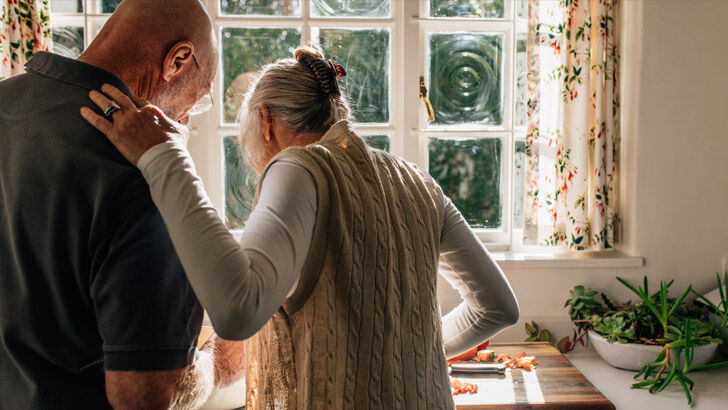How to boost your super according to your age
By Vita Palestrant
Planning for a comfortable retirement is a decades-long mission. While that allows plenty of time for your savings to benefit from the magic of compounding returns, it's not just a case of setting and forgetting - important decisions need to be made along the way.
Young adults open their first super account with a sense of excitement. It's a rite of passage, one that signals their entry into the workforce and their place in the world. It is also the start of a wealth-creating journey that no one regrets doing well.
Saving, or investing, in your super is a highly tax-effective way of building wealth.
But to take advantage of it you need to understand how its rules apply. Once you do, you can adopt strategies that may benefit and reward you at different stages of your life.
Everyone's circumstances are different, which means that a strategy that is appropriate for one person may not be beneficial for another. You can always get help from your super fund or, where the stakes are high, a qualified financial planner.
Here are several strategies worth considering - for those aged 20s to 60s and beyond - that will motivate you to learn more about your super and give it the attention it deserves.

The early years: 20s and 30s
Time is on your side, so make the most of it
Starting on July 1 this year, employers are obliged to pay their employees, including casual and part-time workers, the 10.5% super guarantee (SG) on every dollar they earn. Previously, workers missed out because you had to earn more than $450 a month per employer to get the SG.
There are basically two types of super contributions: concessional (before tax like the SG) and non-concessional (after tax).
Before-tax contributions, including the SG, are capped at a maximum of $27,500 a year. After-tax contributions are capped at a maximum of $110,000 a year.
Lynda Cross, head of advice at industry super fund Cbus, advises people to check that their compulsory contributions are being paid at the correct rate. "Your SG is your money that you are entitled to receive. Even if you can't use it now, it will all add up to a significant amount over the next 40 or so years."
Unpaid super can lead to lower balances and less to live on in retirement. Cbus, one of the biggest funds, helps members recover unpaid super.
"We actively follow up employers who are late or miss contributions to make sure our members get everything they are entitled to," says Cross. The fund recovered more than $100 million of unpaid super in the 2022 financial year.
Cross says young fund members shouldn't put off making extra contributions until they're older.
"The earlier you start, no matter how small the amount, the bigger the difference it will make. Waiting until you are older means you will have to contribute a much higher total amount to get the same outcome as starting early and small.
"If you are earning more than $45,000, for every dollar you earn above this, you pay 32.5 cents in tax. But if you can find some spare cash each month and tell your employer to pay that into super as a salary sacrifice contribution, you'll only pay 15 cents per dollar for that contribution.
"In other words, you will halve the tax you pay. Keep in mind, though, that you can't access this money until retirement," she says.
"As there are different ways to contribute, depending on how much you earn, your fund can give you advice to make sure you get the biggest bang for your buck.
"If you earn less than $57,000, you may be entitled to an extra contribution from the government as a reward for making an after-tax contribution. This can be up to $500, so it [the super co-contribution] can significantly boost your savings."
Under the low-income super tax offset (LISTO), if you're earning less than $37,000, you will get a saving of 15% on your contributions. The ATO will pay it directly into your super.
"Also check that your insurance against death or disability covers you for the type of work you do," she says.
A lot of Cbus members work in the construction industry.
"Many funds, unless they are one of a handful to have the dangerous occupation exemption, do not offer default insurance in super for people under 25, or with a balance under $6000," she says.
"Cbus has the dangerous occupation exemption, so we do cover younger members and low-balance members. For example, our members often work at heights, with heavy machinery or in other high-risk jobs, and our insurance is specifically designed to cover them.
"That way if you are injured and can't work anymore or something goes wrong with your health, you will have money to fall back on. Insurance available from other super funds may not cover hazardous work."
This underlines the importance of reading your insurance cover.
Finally, Cross says first-time investors shouldn't panic when the sharemarket drops. "Don't switch your investments into cash. While this may protect your savings from short-term volatility, if you don't time things perfectly, you can miss out on the recovery.
"It's normal for investments to go up and down, and the types of investments within your super that go up and down the most - shares and property - are the ones that provide the highest returns over the long term. As long as you give your investments time to do this, which you have plenty of (you can't touch your super for another 40 years!). So hang on for the ride. Let your investments do their thing while you're in the accumulation phase.
"There are some fantastic reasons why younger, working Australians should be thinking about super even though it feels like the benefits are a long way off."

The middle years: 40s and 50s
Get serious: check that you're on the right track
By the time people are in this age group, they've moved into more senior roles with higher pay and extra cash to spare.
"This is the age when super actually becomes something that you start to think about more seriously," says financial planner Marisa Broome, principal of wealthadvice.
"Hopefully, you selected the right fund and the right investment option when you first started contributing to super, but this is a good time to review it.
"Is it fit for purpose? If you are in a self-managed super fund (SMSF), is it working as hard for you as you are for it? Or is it something that your accountant thought was a good idea?"
As you approach 60, you may have paid off the mortgage and other debts. "You may have less need of insurance and may be able to reduce the level of cover."
Broome recommends considering the following strategies but, as always, check the rules.
- Super splitting is an agreement between spouses (married or defacto) to split the contributions of one person between both accounts. This can be done for SG contributions, salary sacrifice contributions and contributions that you can claim a tax deduction for. "If you can, contribute the total amount possible as a concessional contribution - $27,500 per annum at present, including your SG and any salary sacrifice contributions."
- This is also the age when inheritances may be received. "Once the mortgage is paid off, super is the next best thing. If you come into a windfall, consider making a non-concessional contribution to super, which is $110,000 per annum. This can also be done using the 'bring forward rule', making up to three years of contributions at once, or $330,000." Your total super balance must be under $1.7 million.
- Finally, Broome advises against falling into the parental trap of helping the kids. "Any losses you make as a result may be hard to recover from. Don't help the kids at the peril of your own retirement - you worked for your wealth and you need to preserve what you have for your quality of retirement, not for them."
Jessica Looi, senior private client adviser at UniSuper, says small changes can have a big impact on our retirement outcomes.
"Have a look at the fees you're paying. A lower-cost super fund could save you thousands of dollars in fees over time and mean you retire with more money in super. The ATO's MySuper comparison site is a helpful resource.
"If you have multiple super accounts, it may be advisable to consolidate to one, to avoid doubling up on fees and additional insurances that you may not be able to claim on."
Fund members should also make the most of government concessions.
"Spousal contributions, for example, may suit families that have one parent taking time out of the workforce. If your income is under $37,000, your spouse may be able to contribute $3000 to your super and receive a $540 tax offset. This can help build that balance and maintain important insurances."
UniSuper has advice available in person across the country, by phone or web meetings. "It's never too early or too late to make changes. A couple of hours with an adviser now could have many years of impact into the future," she says.

The later years: 60s and beyond
Take advantage of the tax perks
This is when your earlier efforts pay off, but there's still plenty of scope to boost your savings. It comes with more rules, particularly age-based ones, so check them first before you act. For example, you may be able to make further after-tax, non-concessional contributions up until your 75th birthday even if you are not working. But this depends on your total superannuation balance.
This could be especially important if you are expecting a financial windfall.
In retirement phase, super fund earnings, including capital gains, are tax free; in the accumulation phase they are taxed at a maximum of 15%.
The amount you can transfer into an account based pension is currently capped at $1.7 million. The transfer balance cap (TBC) is reviewed annually and indexed in line with the consumer price indexing in $100,000 increments.
Once you hit 60 and leave your job, you can access your super tax free. It doesn't stop you from working again. At 65, you can access your super tax free, even if you continue to work.
In the lead-up to retirement you need to think about all sorts of things: do you have enough money, should you put more into super, is it the right investment strategy, do you qualify for the age pension?
"The big thing is to have a plan - and it's not just about your finances. Know and understand what your retirement will look like and aim to be debt free," says Colin Lewis, head of technical services at Fitzpatricks Private Wealth.
"Make a budget of what you think it will cost you to live a comfortable retirement. The Association of Superannuation Funds of Australia, June quarter, 2022, retirement standard figures indicate couples aged 65 need to spend $66,725 a year for a comfortable retirement and singles $47,383.
"Based on your budget and proposed retirement age, it will give you a good idea of how much you'll need to save to lead the lifestyle you want. It's not a bad idea to direct all available surplus cashflow to super in the lead up to retirement, taking advantage of all available tax concessions, if you're eligible."
But not all retirement savings need to be in super to have a tax-free retirement, says Lewis.
"The effective tax-free thresholds for people eligible for the seniors' and pensioners' tax offset (SAPTO) are $33,088 for singles and $29,783 for each member of a couple, so you can still have a reasonable amount invested outside super and not pay tax in retirement."
Retirement is full of complexity and, depending on your situation and how much money you have, it may be worth seeking professional help. For starters, make sure you are happy with your super fund before moving into retirement phase. Once you've started an account-based pension, you can't add to it or change super funds, without going back into accumulation phase and starting a new pension.
"Even if you don't need the pension income, it can be worthwhile to start a pension to get into the tax-free environment - you just contribute the surplus income back into an accumulation account or to your spouse's super fund.
"But if you're unable to do this because your total superannuation balance prevents you from making non-concessional contributions as it was $1.7 million or more at the previous June 30, then consider delaying it. You don't want to be taking money out of super if you don't need it and you cannot get it back in," says Lewis.
Another consideration is taking your spouse's super into account. "It would be sensible to even up super balances between spouses to maximise the amount they can move into retirement phase where one member of the couple would otherwise be in excess of their transfer balance cap."
And regardless of how old you are - provided you are at least 60 - or the amount you have in super, you may be able to take advantage of making a "downsizer" contribution.
"You may be eligible to contribute to super up to $300,000 per spouse from the proceeds from the sale of your home owned for at least 10 years.
"Finally, it's wise to hold two or three years of pension payments in cash to avoid any untimely 'fire sale' of growth assets to fund those payments," says Lewis.
Get stories like this in our newsletters.



